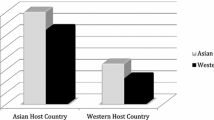Abstract
Companies tend to begin their internationalization process in countries that are ‘psychically’ close. Researchers describe the sequence of entry that firms follow and the mode of entry they choose. They suggest that psychically close countries are more easily understood than distant ones; and offer more familiar operating environments. Although not prescriptive, an unstated conclusion can be drawn linking sequence of entry to performance. Evidence from thirty-two Canadian retail companies shows that only seven (22%) were functioning successfully in the United States. The psychic distance paradox is that operations in psychically close countries are not necessarily easy to manage, because assumptions of similarity can prevent executives from learning about critical differences. Moreover, empirical evidence from 271 CEOs confirms greater cultural differences between Canada and the U.S. than assumed previously. Modifications are suggested to improve the psychic distance concept.
Similar content being viewed by others
Author information
Authors and Affiliations
Additional information
*Shawna O'Grady is an Assistant Professor of Management at Queen's University. She received her Ph.D. from the Western Business School. University of Western Ontario. Her research interests include international and cross-cultural management.
**Henry W. Lane is the Donald F. Hunter Professor of International Business at the Richard Ivey School of Business (formerly the Western Business School).
Rights and permissions
About this article
Cite this article
O'Grady, S., Lane, H. The Psychic Distance Paradox. J Int Bus Stud 27, 309–333 (1996). https://doi.org/10.1057/palgrave.jibs.8490137
Received:
Revised:
Accepted:
Published:
Issue Date:
DOI: https://doi.org/10.1057/palgrave.jibs.8490137




